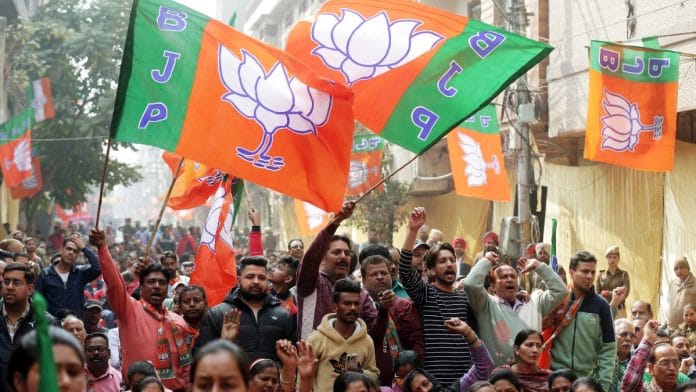Thank you dear subscribers, we are overwhelmed with your response.
Your Turn is a unique section from ThePrint featuring points of view from its subscribers. If you are a subscriber, have a point of view, please send it to us. If not, do subscribe here: https://theprint.in/subscribe/
India is no stranger to strong governments. Yet over the past decade, critics argue that the Bharatiya Janata Party (BJP) has crossed a threshold: it does not merely seek political dominance, but aims to engineer not just actions—but the very psyche of citizens. It is no longer enough to win votes; the deeper project is to determine what people should eat, whom they should admire, how they must live. Such ambitions raise fundamental questions about human dignity and freedom.
The Drive for Psychological Domination
A democracy gains legitimacy by respecting individual agency. But when a ruling party begins prescribing the rhythms of life—dietary habits, moral ideals, cultural norms—what remains of personal sovereignty? The concern today is that the BJP does not simply govern India; it aspires to re‑program India.
“The State must not become a factory of souls.”
This apprehension is not hypothetical, either. Over the last decade, India’s rating on civil liberties has declined. In the “Freedom in the World 2025” report, Freedom House judged that: “Individuals are somewhat constrained in expressing views on political or sensitive topics… Activists, Muslims, and others are regularly charged with sedition.” Academics, too, face pressure. Professors find that sensitive topics—Kashmir, minority rights, state policies—are effectively taboo. In short: open inquiry is turning into a narrow corridor.
Dominion over the Public Sphere
Psychological dominance is not achieved by rhetoric alone; it requires control over institutions, narratives, and symbols.
Media capture is central. Ravish Kumar coined the term “godi media” (literally, “lapdog media”) to describe outlets seen as parroting government narratives. By aligning media with ruling power, dissenting voices are marginalized, and the worldview the regime wants becomes visible as “common sense.”
Digital surveillance and data control are another vector. India’s Digital Personal Data Protection Act has been criticized for giving the state broad authority over citizens’ information. Moreover, revelations suggest attempts by state actors to plant spyware (like Pegasus) on phones of critics, including parliamentarians.
Social media operations help shape perceptions. During the 2024 election, the BJP and its affiliates amplified narratives such as “Vote Jihad” to polarize discourse. Disinformation campaigns are no longer fringe—they have become a tool to engineer belief.
Culture as the Battleground
If politics is about who rules, culture is about who becomes. The BJP’s deep intertwining with the Rashtriya Swayamsevak Sangh (RSS) ideology means the party’s goals are not just electoral but civilizational. Scholars argue that the BJP exhibits “fascist characteristics” in its project of converting the public domain into a Hindutva‑ideological mainstream.
The rewriting of history and selective valorization of figures is another symptom. Critics note that the government has repeatedly “distorted the history of the freedom struggle” to suit its ideological narrative. When the State begins to sanction one version of culture, dissenting identities—linguistic, religious, regional—are relegated to the margins. This is psychological domination, not just political.
The Promise and Peril of Consent
A regime that seeks to shape minds must also manufacture legitimacy. The BJP invests heavily in symbols, mass spectacles, and the rhetoric of inevitability. As one commentator put it: “Hegemonic parties sustain their power by convincing people of their own invincibility… When even opponents start to believe this myth of invincibility, they collude with the ruling regime.” This is soft control: not coercion in force, but consent through overwhelm—when the line between genuine belief and conditioned acquiescence fades.
Why It Matters
When a government instructs people what to live for, it violates a foundational democratic compact: that citizens are ends in themselves, not molds to be shaped. The BJP’s project of controlling diets, ideals, and mindsets is more than policy overreach—it is a foundational threat to the idea that humans should be free to become themselves.
As Pratap Bhanu Mehta observes: “It is between elections that a decline in civil liberties and political rights is evident… The checks and balances of a constitutional democracy are eroding.” Our struggle is not just political, but moral.
What Must We Do?
- Demand institutional checks — courts, legislatures, and the press must be able to act independently.
- Protect spaces of dissent — universities, artistic expression, and local media must remain sanctuary zones of freedom.
- Cultivate political self‑belief — citizens must recover the faith that alternative ideas need not be defeated; they must be contested and won.
“Quis custodiet ipsos custodes?” — Who watches the watchers?
If we fail this test, democracy will not perish with a bang, but with a vignette: a people whose bodies we control, but whose minds we never truly had.
These pieces are being published as they have been received – they have not been edited/fact-checked by ThePrint.


